
What would it be like to meet and train with dozens of the top experts in the Chinese Internal Martial Arts? Can you imagine the vast knowledge, the combined years of wisdom and experiance these teachers could transmit to you?
Well, that's exactly what author Jess O'Brien did as he compiled interviews with master instructors of Tai Chi Chuan, Bagua, Xingyi and other related arts.
I've wanted to get my hands on this book for some time now, and I've dog-eared page after page with insights and instruction for future review.
O'Brien visited scores of instructors and whittled his compilation down to 16 interviews that are solid gold for students of the Chinese Martial Arts.
This book is not a "how-to" of technique and application, it is a collection of deep thought and personal experiances of some of the best martial artists of our time. As Chinese Internal Martial Arts are unique, this is a book of self-exploration.
Jess O'Brien was kind enough to describe his journey in writing "Nei Jia Quan", here's a few questions I asked him:
(D.R.): How did you choose the master instructors that you interviewed?
(J.O.): My boss said I could publish anything I wanted. So after I thought about it for a while, I started making a list of everyone I'd ever heard of that would be cool to talk to and train with. I think I had close to 200 names. After that it was a matter of luck and timing as I was on the lookout for visitors to the Bay Area as well as on my own travels. Unfortunately I wasn't able to go to Asia, so it was only people here in the states that I was able to access. Luck was with me and many good teachers either came through or were teaching here. So the book developed quite randomly. I wish I could have done it more systematically with a budget for time and travel, but that was impossible. I did about one interview a month for two years and picked from the best of them. I hope other people will interview their teachers and publish them, because this was just a tiny drop in a huge bucket.
What was really amazing was how open these teachers were to speaking with me. Most interviews were done after a day seminar or class, and often on my first meeting with the person. I was expecting to be turned down often, but virtually all of the teachers in the book were willing to go out of their way to speak with me. Furthermore they all answered honestly and with depth, never did anyone deny any of my questions, even about their own teachers! A number of times their students said to me that they were surprised at how much was said at the interview, as Chinese martial arts teachers are fairly conservative about what they say. Normally they only tell the student what would actually be useful during that stage of their practice. Since I was an outsider they could expound more deeply on the topics I mentioned, not speaking to me as an individual but to the public at large through me.
Many of the discussions I had in the book didn't make much sense to me at the time, but have gradually become more clear as I've trained more. Various things pop out at me and I go, wow why didn't I pick up on this before? Which is cool, I'm as much a reader of the book as anyone else, all I did was copy down what the teachers said, without trying to interpret it beyond editing for clarity.
My intention for the book was to follow on the footsteps of great writing like Pa Kua Chang Journal, RW Smith's books, BK Frantzis's books, and all the others out there that kept inspiring me whenever I got bored in training. Not focusing on the mystique and uniforms, but on the people, the history and the day to day training. PKCJ was especially a ground breaker. Dan didn't use the word master or grandmaster, only people's names, and that made a lot of sense to me. We are past the era of inflated expectations and mystical flying combat nonsense. Chinese martial arts offer very pragmatic and utilitarian training concepts, whether on a physical, mental or energetic level. That's plenty, we don't need to use the word "devastating" any more. We can speak of effective and useful, we don't need to carry the weight of being secret and deadly, that just leads to fear and frustration.
Part of the mystique of Chinese martial arts is this image of a wise, unapproachable master who sits above the crowd. I found the opposite to be true, all of the teachers I spoke with were gracious and friendly and open to questions. They didn't feel threatened at all by my questions. I hope readers of the book will seek them out. They were normal people who had trained to an extraordinary degree. They all emphasized cultivation and hard work, not short cuts or fantasies. However, each had a somewhat different take on the path. Some liked combat sports, some focused on chi, some were TCM oriented, some were fascinated by the intricacies of physical mechanics. Some were oriented toward mindfulness and awareness, some loved to fight in the street, and others gave me very cool lessons in history and culture. Chinese martial arts has all of these things and much more within it. I set out trying to find out how to define internal martial arts, but in the end the definition is much wider than any one person can ever uncover, in my opinion.
(D.R.): There is a wide variety of opinions from the Masters about the cultivation and use of Chi in the Internal Martial Arts. After meeting these Masters, have you formulated your personal thoughts on Chi?
(J.O.): I remain open to all ideas on Chi. Whether it is a substance, or a metaphor, whether it is at the core of IMA, or irrelevant. In Religious Studies we speak of simultanous truths. For Islam to be right doesn't mean Taoism is wrong. A Native American who believes in the Creator doesn't negate a Buddhist who doesn't believe in God. Both are right. I apply this thinking to martial arts as well. Our idea of what works and doesn't, our framework of how we construct our training and interactions contain multitudes of unspoken assumptions. That's how humans work, and trying to scientifically define everything and put it all in its correct place is somewhat futile on a grand scale. We can only pick our favorite worldview and work from it, while keeping an open mind. If it gets results, it works. What you want as a result may be radically different from someone else, however. So for me it's a constant process of allowing new insights to arise and keeping the ones I like.
If I learn a technique that doesn't use Chi, then that's how I practice it. If someone else teaches me something energy based, I follow those instructions to the best of my ability. It all doesn't have to fit together neatly in some unifiied theory of everything. I'm not smart enough to put it all togther. That's why I created this book, I couldn't define Internal Martial Arts, so I asked all these other folks to do it. When you look at the mosaic that their answers form, you can find things that you agree with and things that you don't. But all the teachers in the book are or were effective fighters, so that in itself is a lesson for me. Different paradigms can achieve great results.
All these different paths are to suit different personalities and inclinations, not because one way is better than the others. And I think that goes all the way back to historical Chinese martial arts. There have always been the mystics, the nerds, the soldiers, the bodyguards, the sport fighters, the calligraphers, the farmers, etc. Each one needs a martial art to suit them, and no one art will ever give everyone what they need. Different things inspire different people.
(D.R.): Has the openness of the West truely expanded the knowledge base of Internal Arts, or has something been lost from the age-old traditions and training methods?
And; given the popularity of MMA and grappling training, is there a strong future for the Chinese Internal Martial Arts in America?
(J.O.): Martial arts in the west is certainly an interesting situation. I think the initial appeal of Asian martial arts made a big splash here. It's something we didn't have, the culture of discipleship where a master helps a student forge himself. That's very cool and outside of sport it was hard to find such a situation here. It's part of human nature I think to want to experience such a mentorship. These Asian martial arts had new fighting methods as well, new ways of sparring and competing. They also had ideas about meditation, healing, and developing and training the body in new ways. The emphasis on self-cultivation rather than winning sport matches was also something new that appealed to many of us who were burnt on competitive sports. The focus on longevity and training for life was another new concept in the USA where we watch sports and don't participate as much. So Asian martial arts brought many cool things to the west that we've really come to enjoy. And I think the west is now influencing Asian martial arts with our emphasis on effectiveness in NHB and sport fighting in general. So it's come full circle in that regard. However new circles are being created as our medical and psychological world has become fascinated with the mindfulness and mind training that all Asian arts use as a base, including martial arts.
Working on this book really brought home to me how martial art and sport are two different worlds. As I've ranted on RSF and other message boards for years, they are simply different fruits, you don't get much out of comparing them. For instance, playing the flute and playing football both take time and effort and dedication. But flute is in the ear of the beholder, and football has stats that show who is better or not, clear cut, no BS. Art will always have this undefineable quality, for the creator and for the observer. Sport is great because it has rules and measures to determine quality. If you win the Superbowl, you are the best. If you sell a lot of albums, people may still hate your flute playing. There is no standard that applies across the board.
Many people are frustrated by this, and want to define martial arts in one way or another. Say, if it isn't good in the ring, toss it out and modernize it. However, you risk losing the baby with the bath water. The practices you toss out now, may have benefitted you in some other way down the road. Asian martial arts have many sides to them, sport fighting is one of them. But training the mind is another. Training your nervous system, training your knowledge of yourself, training your ability to heal, to survive. Not all of these things help you in a fight right this minute, but they could save your life in another context.
Nobody does forward rolls in the UFC, yet they've saved lives on the street in accidents. That's just one example. I have learned that martial arts are their own thing, and are not equivalent to sports. I think the term MMA is unfortunate, NHB is much better. Because martial arts is something my grandma or my son could do, and benefit from. NHB, probably not as much, it's emphasis on sport is a world of its own. To excell in sport requires tremendous dedication, resolve and unyeilding desire to win. A good sportsman has a huge high standard to reach if he wants to win a professional match. Whereas martial arts can be forms, meditation, healing or a million different things. It may annoy some people, but martial arts is not just what you want it to be, it is relevant to others in ways that it's not relevant to you.
Of course, martial arts and martial sports cross over. They both fight. And there is much to learn from a good fighter,no matter where he learned it. So this could be a golden age for Chinese martial arts. There are so many great sport fighters out there, we can all safely test ourselves in ways that the previous generation never could. We can win and lose against great practitioners, who are game to fight. Fighting under their rules may be frustrating, but it only makes you better in the long run. Gloves, ropes, pads, points, etc, all these things will limit your technique and help you refine what you have to a huge degree. Chinese martial artists who don't spar widely in this day and age are missing out on tremendous opportunities for growth.
That said, sport is only one aspect of Chinese martial arts. Sparring is a tool, but only one among many. Medicine, meditation are also tools. Forms and conditioning are others. These martial arts have much to teach, if you find the teacher and system that suits you. Some people want to define CMA as one thing or another, but again, from all the interviews I did, I'd never presume to speak for a tradition so vast and deep. There is much we in the West don't know about Chinese martial arts, so the time is premature for anything but hypothesis. A hundred years from now we will know more, and our understanding of it will be refined. Who knows what it will end up being at that point.
On the topic of fighting, one thing I noticed in the people I met was that the oldest guys who had fought in wars and seen people killed in battle and in gang fights all disliked sparring. To them it was like ping pong, a waste of time when training your body and mind is more important. I take their advice quite seriously. However, as a suburban dude from modern Northern California, I've never been in a fight in my life. So I must use sparring as a tool to learn about courage, how to take a punch, how to attack someone who is defending strongly. I've never had to fight for real, so I use play fighting as a way to get something of that adrenaline surge. However, being realistic, the people who I met that did fight for high stakes told me that there is utterly no comparison between a sport fight and a fight where your life is in danger. I'll take their word for it, and if I'm lucky I'll never have to find out if they are right about that.
My last word is to reiterate that Chinese martial arts are in their infancy here in the West. From hints I got in my interviews, there is much underlying these arts that we haven't yet been exposed to or understand. We may well reject these cultural underpinings or change them to suit us as westerners. But before we do that we will need decades of travel, translation, investigation and testing to begin to comprehend the depth of the well that these arts are drawn from. Chinese martial arts are a product of Chinese culture, and the way they look at these arts is not the same as how most of us do. There is vast diversity in the way they are trained and understood, so again, I feel that we need to continue to take them at face value and train them as directed. Over the next few decades many new insights will come to light and we'll have a much clearer idea of the whole tapestry that makes up Chinese martial arts, rather than the incomplete threads we've seen so far. Of course I could be wrong about this too, but I'd rather be conservative and work slowly than presume too much and miss the boat on some of the amazing aspects of this stuff that may not be apparent in the short term. There's a lot of good stuff in these arts, so it's an art I'll always be learning more from.
Thanks so much to Jess O'Brien,
You can find "Nei Jia Quan" and hundreds of other martial arts titles at the website for BLUE SNAKE BOOKS
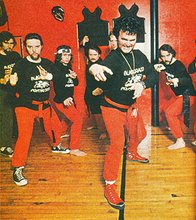




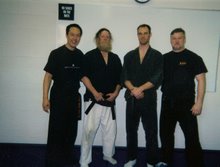
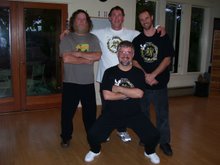

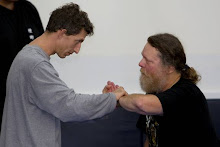
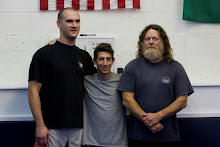



8 comments:
I admire the work Jess has done. I disagree with him on the subject of chi. It isn't the same as religion. It's either a scientific reality or it is only mental visualization. After you meet martial arts masters, you should understand that they are only human like everyone else. Often, they are petty and jealous, exhibiting the same emotions as people who have not been put on pedestals. None of them have supernatural powers. Most of them have the type of skill that any athlete has if that athlete has practiced a sport or art all his or her life. By remaining uncommitted on the subject of chi, it might sell more neijia books, but it doesn't help anyone find the truth. The truth is, all internal arts are physical skills, not metaphysical.
Hi Ken;
I went to your website (click on ken's name and go to the website),
and I really like your "single whip" presentation.
As far as your comments about Jess O'Brien's comments on Chi, I can relate to what he was saying.
I have trained with Tim Cartmell, who is very, very skilled and puts little emphasis on Chi. Yet Tim is filled with Chi in my opinion.
I think every instructor has his/her way of relating to the arts. It seems to me Jess was merely being respectful to the way each teacher presented the information.
As I said, I do not presume to speak for Jess, this is just what I feel myself.
With that said, I have read new books such as "The Wellspring" (which I have reviewed) that make me understand more about the recent scientific studies of Chi.
I have felt it, I am a believer as far as what goes on in my own body.
Please feel free to contribute any comments anytime, and if you have a youTube page, please let us know!
Cool interview, thanks! I've read the book and enjoyed it. Didn't agree with everything in it but that's bound to happen. There's a bunch of great info in it anyway.
Wim
Fantastic and inspiring Interview thanks to Jess and Dojo Rat!
(p.s. I too have enjoyed the sensation of 'chi' :))
Well-written and interesting interview. As the previous poster wrote, thanks to both Jess and Dojo Rat!
Hi all, thanks for reading! It really feels nice to hear that you enjoyed the book, and my comments here. Just food for thought, nothing conclusive.
Ken, thanks for commenting. Again, my position is agnostic, my view is that we should train the arts as they are presented, not as we think they are supposed to be. Being uncommitted on Chi has nothing to do with selling books. Merely that I've learned to train Chinese martial arts with and without the use of Chi. Both approaches are legitimate and both get good results. Both are historically present throughout Chinese history, and both approaches can be used for health, meditation and fighting. That is my personal, direct experience.
I don't make claims such as "the truth is..." The more expert teachers I've met, the less capable I've become of defining exactly what Chinese martial arts are supposed to be. I used to think I knew it all until I met all these guys. Rather, the more experts I meet, the more I appreciate the diversity that these traditions contain.
I don't think I can define "scientific reality" in the context of an art form like martial arts. Each of us have a perspective based on our experiences. Through your vast experience and knowledge of Chinese martial arts, you have apparently determined that Chi is "only" a mental visualization. There are experts in my book that agree with you. However, there are people in my book that argue otherwise, based on their fighting skill. They are very persuasive. They can explain to you better than I can.
The purpose of my book is to provide resources and leads to investigate for those who seek answers, but if you already know the answers, then this book is not much use. I don't feel the need to improve Chinese martial arts and cultural traditions by refiltering them through my own cultural lens. What suits me best is to train as I was taught and enjoy working with the small bits of these arts that I've been exposed to. I apply them to sparring, meditating and to improving my physical health. They seem to work fine, although I still haven't found the "truth" as you put it. I'm too busy training to worry much about that. Take care,
Jess O
Did you know that you can shorten your urls with OUO and receive cash from every visit to your short links.
hermes outlet
hermes bags sale
off white shoes
Post a Comment